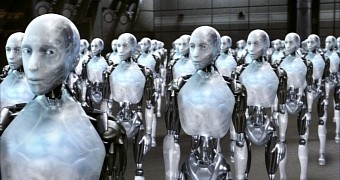Microsoft is one of the companies that are pushing for artificial intelligence to be more widely adopted in technologies around the world, and the latest edition of the BUILD developer conference is living proof that the software giant is already working at full speed to make this happen.
With bots that can already take care of things for humans, some people are worried that we’re rapidly heading towards a world dominated by robots, where they can take easily take over the reins should anything go wrong.
Physicist Stephen Hawking and Tesla founder Elon Musk are two of the most important figures who warned about the impact robots could have in our worlds. “The development of full artificial intelligence could spell the end of the human race,” Professor Hawking said while Musk added that investing in machines is “something seriously dangerous happening.”
No immediate risks
But as far as Chris Bishop, director of Microsoft Research in Cambridge, is concerned, there’s no risk when it comes to investing in robots right now, as humans still have control of anything they do. He explained in an interview with The Guardian that these comments are only “dramatic views” and warned that such fears could actually impact the evolution of robots.
“The danger I see is if we spend too much of our attention focusing on Terminators and Skynet and the end of humanity. [We are] generally just painting a too negative, emotive and one-sided view of artificial intelligence - we may end up throwing the baby out with the bathwater,” he said.
He went on to explain that robots do not pose an immediate threat to humanity, as we are only decades away from the moment when “those comments could make any sense.”
Robots still unable to do a lot of things
Bishop did admit, however, that the investments companies made in robots could raise threats unless an equal effort is being made to counteract the damages that such technologies could cause should anything go wrong.
Furthermore, he warned that, in the short term, robots could lead to job losses, as more companies discover the benefits of automatic systems that perform a growing array of tasks, but if everything is handled correctly, no such thing can happen, he said.
“There are many, many things that machines can’t begin to do that are very natural to the human brain and at this point to talk about machines with the full spectrum of capabilities of human intelligence is highly speculative and most experts in the field would put this at many decades away,” Bishop concluded.

 14 DAY TRIAL //
14 DAY TRIAL //